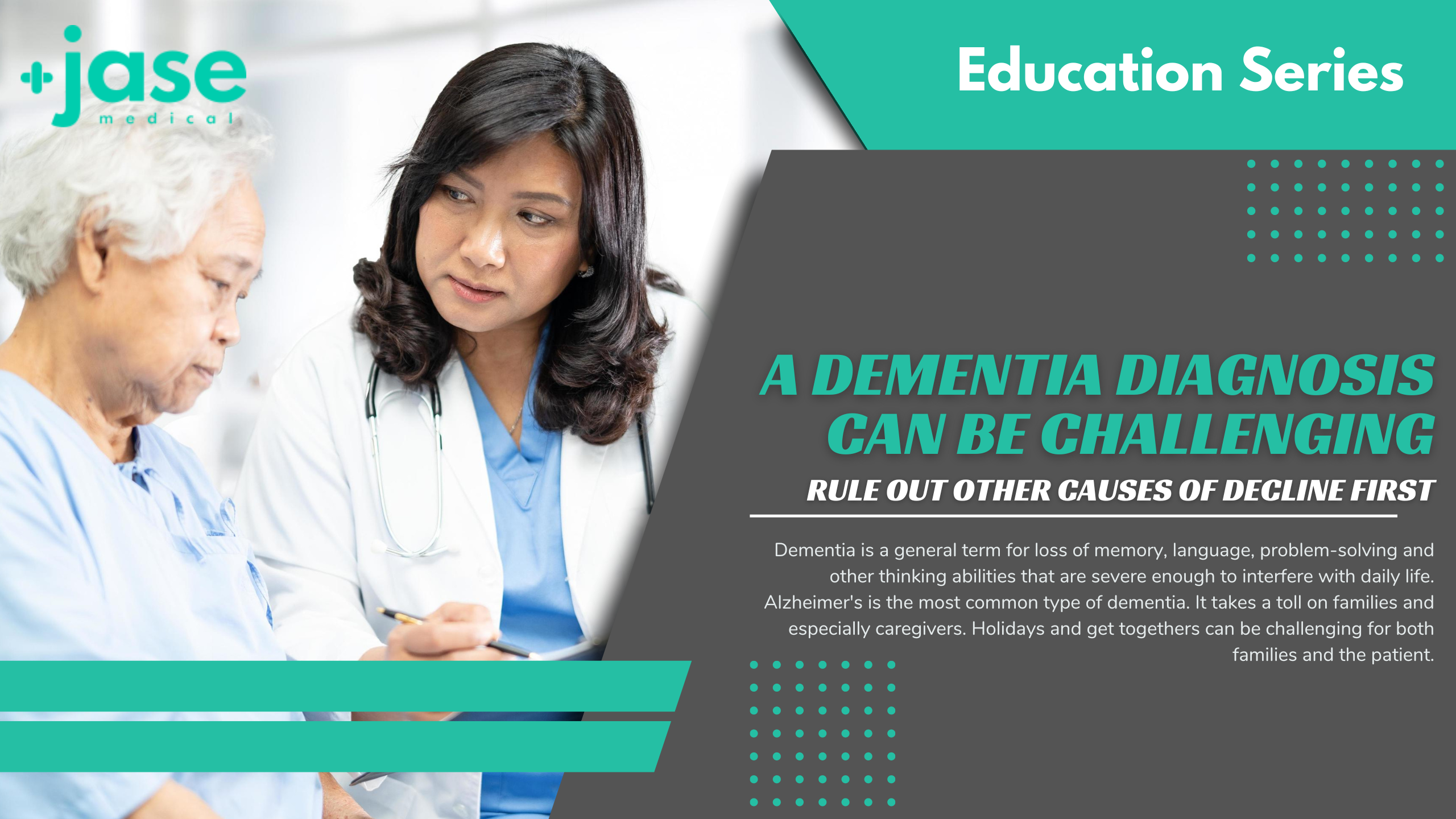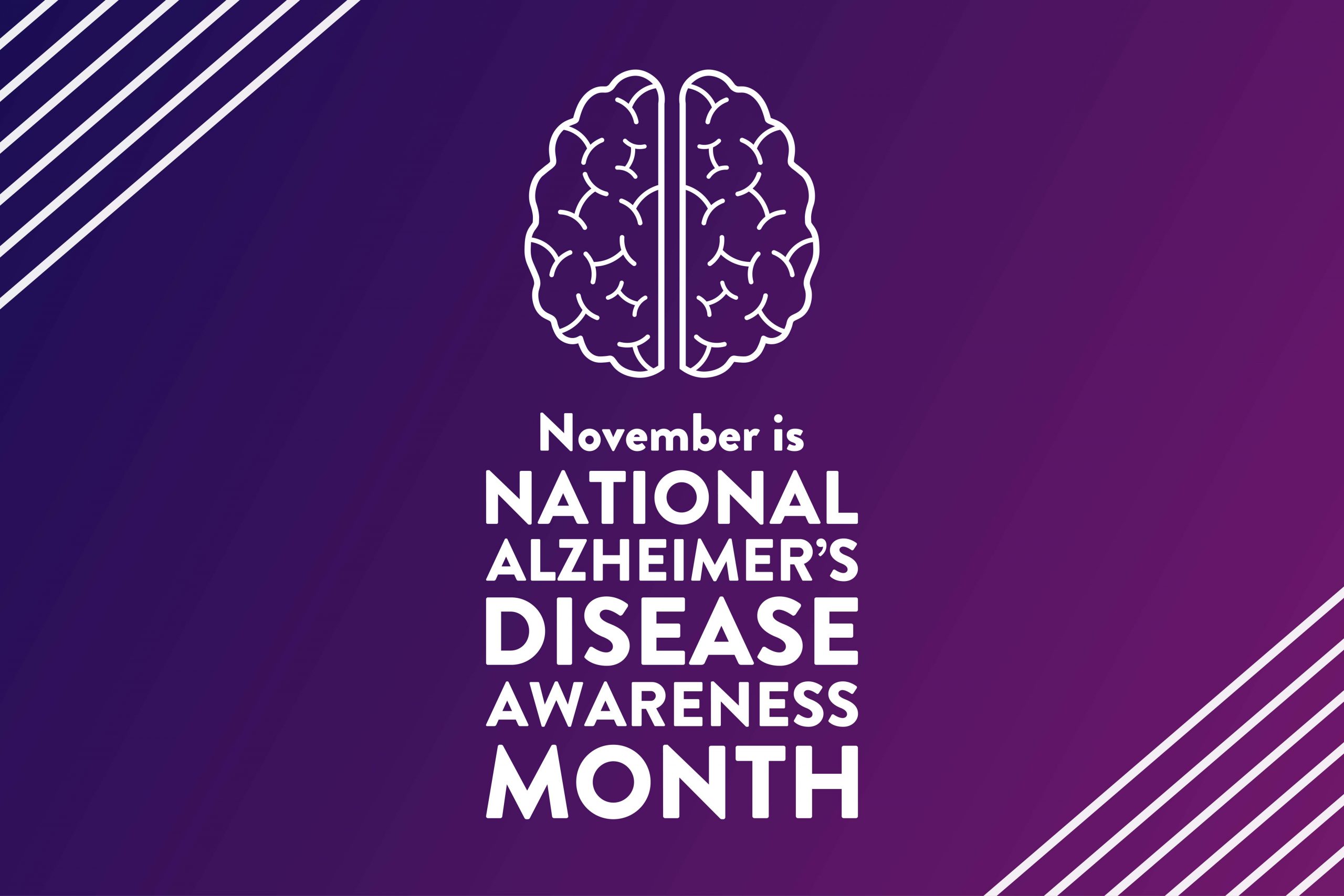
Rule out other causes of decline first
Dementia is a general term for loss of memory, language, problem-solving and other thinking abilities that are severe enough to interfere with daily life. Alzheimer’s is the most common type of dementia. It takes a toll on families and especially caregivers. Holidays and get togethers can be challenging for both families and the patient.
Some symptoms of early onset of dementia are:
- Confusion
- Loss of coordination-tripping, unable to hold items
- Memory loss especially short term
- Inability to reason complex situations
- Emotional lability- anger, sadness, depression.
As dementia progresses symptoms become more pronounced, and leads to physical inability to take care of self independently
- Genetics
- Age- older adults are more at risk for a dementia diagnosis
- Alcohol abuse
- Smoking
- Social isolation
Alzheimer’s dementia
- Twice as many women as men are diagnosed with Alzheimer’s dementia
- Most are over 65 years.
Alzheimer’s disease leads to nerve cell death and tissue loss throughout the brain. Over time, the brain shrinks dramatically, affecting nearly all its functions.
Symptoms are mild to start and progress over time. Early symptoms are forgetfulness- of names or items such as keys are, unable to recall family or friends names along with forgetting special dates or appointments
As disease progresses changes in mood, depth perception and inability to organize thoughts and cognition are apparent. In later stages of Alzheimer’s the person experiences hallucinations, delusions and is physically incapable of performing basic hygiene.
Frontotemporal
Frontotemporal dementia (FTD), also called Picks disease is one of the less common types of dementia. It covers a range of different conditions that can affect personality, behavior, and language. FTD is mostly diagnosed in people under 65. Average onset is between 40 and 60 years, however it can occur as early as 20 years old.
Dementia with Lewy bodies
Dementia with Lewy bodies (DLB) is caused by Lewy body disease. In this disease, tiny
clumps of proteins – known as Lewy bodies – appear in the nerve cells of the brain, and progresses to decline in reasoning, independent function. and cognition. It can be hard to diagnose because it presents similar to many psychiatric symptoms
Vascular Dementia
This type of dementia- which is sometimes called “Post Stroke Dementia” is different from Alzheimer’s or Lewy Body Dementia. Vascular Dementia is brain damage caused by bleeding or harm in the brain-such as a stroke. Symptoms that identify Vascular Dementia are observed immediately following a stroke and can include:
- Changes in personality,
- Depending on the area of the brain that has been affected- thinking short attention span
- Difficulty reasoning organizing and analyzing thoughts
Correct diagnosis of dementia can be challenging
Many medical conditions, physical and emotional factors, along with medications can mimic dementia.
Medical conditions that can present as dementia like symptoms:
- Liver and kidney disease– accumulation of toxic metabolic waste products in the blood can cause confusion and inability to form cohesive thoughts.
- Infections– notably urinary tract infections can cause confusion and personality changes.This is more common in older population, symptoms of urinary tract infection sometimes present with different symptoms than younger population. Other infections should also be ruled out, such as syphilis or Lyme disease.
- Cancer-especially brain cancer- by tumor pressing on the brain- or an immune response in which antibodies against the brain are formed, producing a “paraneoplastic syndrome”.
- Endocrine dysregulation– such as thyroid gland (hypo or hyperthyroid) or diabetes- both of these conditions can alter mood, ability to coordinate and concentrate.
- Head trauma– concussion
- Depression– which can alter and slow thought processes and cause inability to make decisions along with irritability and mood changes.
Physical conditions that can present as dementia like symptoms
- Poor vision– resulting in tripping, falling and bumping into furniture, walls, stairs, etc
- Hearing loss– A Lancet Commission report on hearing loss showed a link between hearing loss and cognitive decline, leading to a diagnosis of dementia.
- Lack of sleep– inability to concentrate or pay attention can mimic dementia, however research points to altered sleep patterns , even one nights sleep disruption has been shown to increase the beta amyloid plaque – the protein that causes dementia in the brain.
Medications that can mimic dementia
Some medications can take a long time before symptoms set in, so if you notice any cognitive changes even without a change in medication- either over the counter or prescription review with your care provider your concerns.
- Anticholinergic medications-such as tolterodine or oxybutynin, often used to treat urinary incontinence, Benadryl used for allergies and for sleep,
- Tricyclic antidepressants such as amitriptyline for example
- Antipsychotics such as Seroquil
- Benzodiazepines such as Valium, Xanax, and Librium
- Sleep aids such as Sonata and Ambien
- Corticosteroids such as Prednisone
- Narcotic pain relievers- such as morphine
- Anti-Parkinson drugs such as trihexyphenidyl (Artrane)
It is important to make sure all other causes of confusion, memory loss, poor coordination, mood changes and other dementia mimicking signs have been considered before a diagnosis of dementia is made. Many medical conditions, physical conditions and drugs mimic the symptoms of dementia, take the time to review them and discuss with your care provider.
If a definite diagnosis of dementia has been made there are many resources available. One is the Alzheimers.org online support group and help with finding local resources to help with caring for your loved one.
- Brooke Lounsbury
Medical Content Writer
Lifesaving Medications
Recent Posts
Keeping you informed and safe.
FAQ: Our most commonly asked questions about Jase
If you’re considering Jase, chances are you’ve paused and thought, “This makes sense, but I still have a few questions.”You’re not alone. Here are the most common ones we hear, answered plainly. Is this really doctor-prescribed? Yes. Every Jase order is reviewed by a...
Medical Readiness: What Really Kills First
When Disaster Strikes, It’s Not Hunger or Thirst That Takes the First Lives In every disaster zone, from hurricanes in the Caribbean to war zones in Ukraine, the pattern is the same. People worry about food and water, but it’s infection that kills first. A small wound...
Exploring Dr. William Makis’ Hybrid Orthomolecular Cancer Protocol: Focus on Ivermectin and Mebendazole/Fenbendazole
Exploring Dr. William Makis’ Hybrid Orthomolecular Cancer Protocol: Focus on Ivermectin and Mebendazole/Fenbendazole *Disclaimer: This article is for educational purposes and does not constitute medical advice. Always seek professional guidance.* In the evolving...




